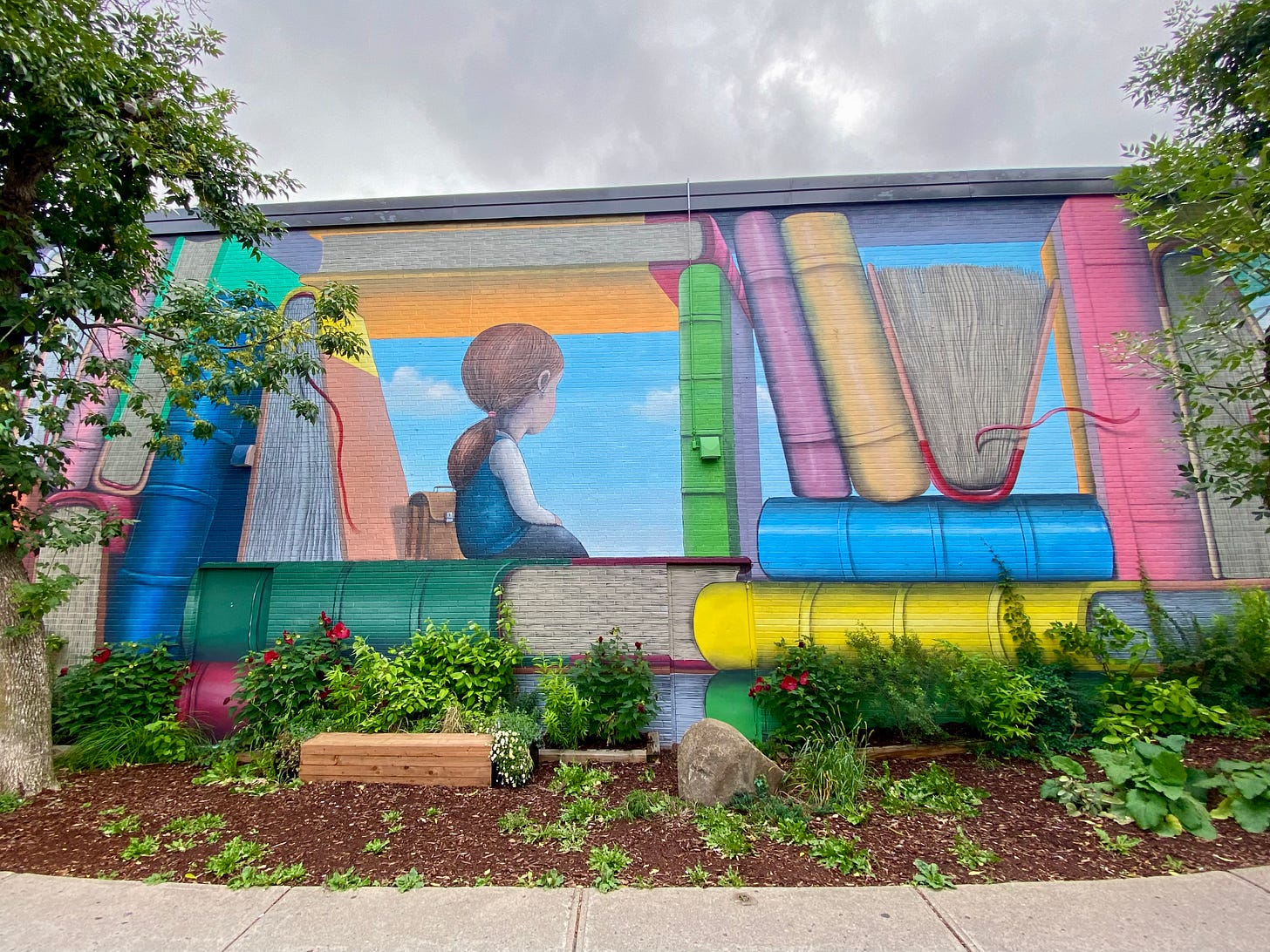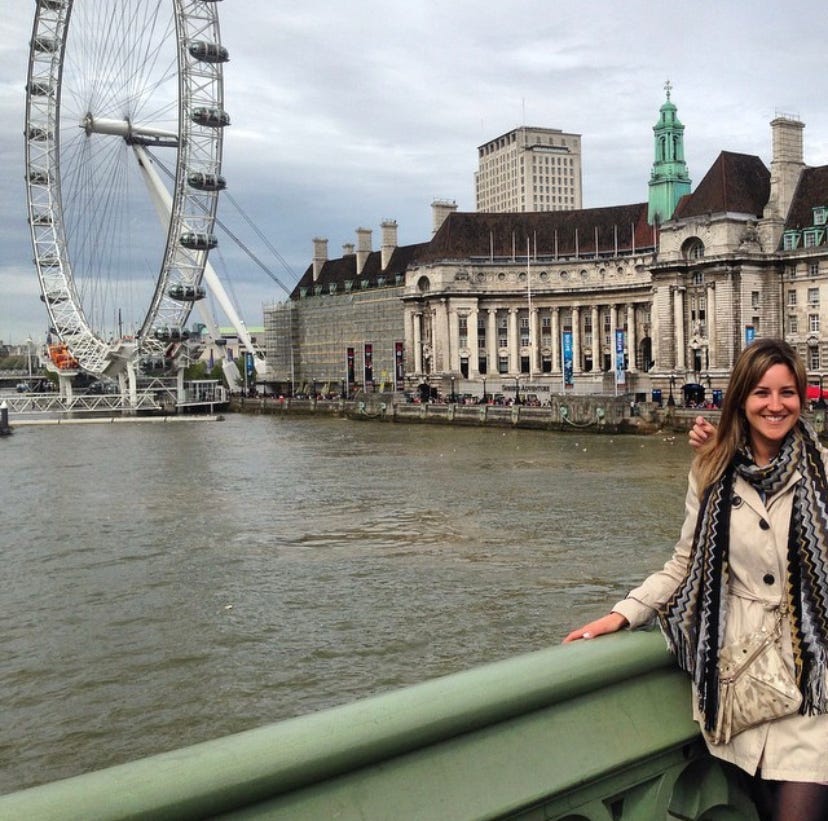After a day in the orbit of pure, unfiltered chaos—otherwise known as a five-year-old’s birthday party—I sank into my couch on Saturday night, scrolling Netflix with mindless determination for light entertainment.
My Oxford Year had prime real estate as a new release, and given my love of the UK, writing, and romcoms, I was easily sold on a love story against the backdrop of a poetry class at Oxford. I clicked ‘Play’ expecting pleasant background noise while I re-energized, wholly unprepared for what unfolded—the same way I felt watching Me Before You for the first time, when I settled in with minimal expectations only to wind up sobbing by the end as though I’d suffered a personal loss.
The heartbreaking beauty of both book-inspired films is their exploration of thinking you’re living deliberately versus actually doing it.
And that crux has completely reframed my own UK-inspired book project.
The Pitfalls of Planning
Both Anna in My Oxford Year and Louisa in Me Before You begin their stories believing that living deliberately means having a solid plan rooted in security—something I can relate to wholeheartedly.
Anna arrives at Oxford with carefully mapped academic goals, a lengthy bucket list, and a deferred job opportunity at Goldman Sachs in New York City. Louisa is living in a cramped family home with her parents, her sister Treena, and Treena’s young son Thomas while working at a café to help support everyone following her father’s job loss.
Both Anna and Louisa, ages 24 and 26, have their worldviews rewired when confronted with new people and places.
Anna learns from Jamie, her terminally ill poetry professor-turned-boyfriend, that planning isn’t what Thoreau meant by “living deliberately.” It's about being where your feet are, because savouring each moment, no matter how messy and uncertain life gets, is what makes us feel most alive.
Louisa learns from Will, her quadriplegic employer and former heartthrob who lived an incredibly worldly life before his accident, that real, deliberate living is about recognizing your own worth and refusing to settle for the smallest possible version of yourself.
Both women learn to be present in uncertainty rather than rushing toward some imagined resolution.
I learned the same lesson at 24 when I got rejected from law school. In a span of 24 hours, I went from feeling like a failure as the “safest” path ahead disappeared from sight, to feeling free to pursue my dream of moving to London as the quiet question of “What would I do if I could do anything right now?” allowed me to tap into my intuition.
I’ve often wondered why that memory was so profound. Now I realize... asking myself that question was the moment I started living deliberately.
The Evolution of a Story
When I started my book project twelve months ago, I planned to write a memoir about moving from Montreal to London at 24 and all the transformative people and places I encountered. It seemed like the most natural extension of how I’d been using my Substack as a picture window, sharing my entrepreneurial journey over the previous three years.
But as I started writing, I realized I wanted to maintain privacy for myself and others. At first, that felt like a problem since I was compelled to strip out intimate details that robbed my stories of their spirit.
But then I decided to reframe the problem as an opportunity: I could pursue creative liberty by switching genres. Memoir demands fidelity to literal events, but as
recently reminded me, “a good novel amplifies what is true.” So a few months ago, I landed on a fictional concept inspired by my experience, rather than limited to it.While Anna and Louisa learned that the best experiences can’t be planned down to the last detail, I’ve learned that the best stories sometimes outgrow their original containers.
From Seeds to Something
I had a surge of enthusiasm about my new concept when I landed on it. But over the past few weeks, I’d been second-guessing whether a story inspired by my experience of finding myself through failure and beginning to live deliberately at 24 would resonate with the thoughtful, established readers I’ve connected with through my Substack.
But watching My Oxford Year reminded me that coming-of-age-abroad stories are timeless because they inevitably teach you what Paulo Coelho describes beautifully:
“The journey is not about becoming anything, but to unbecoming who you are not.”
Coelho’s quote inspired the first online post I ever wrote—on Medium in February 2021—about my decision to chase a dream that had been lying dormant behind a practical path. Four years later, that very post has inspired my forthcoming novel, Unbecoming.
The Power of Perspective
At 35, I feel every emotion the films My Oxford Year and Me Before You evoke more acutely than I would have in my twenties. Looking back on those pivotal years I spent in London becomes more poignant over time, and I feel inspired by my younger self’s willingness to leap into uncertainty.
Reflecting on my experience through the lens of fictional characters like Anna and Louisa makes it abundantly clear that “quarter-life crises” are actually a rite of passage. For many of us, it’s the first time we question whether the path we’re on is actually ours and not a well-trodden path we’ve been conditioned to follow.
What looks like recklessness to family and friends (“Why are you throwing away stability for uncertainty?!”) is often the first deliberate choice we make to honour our authentic selves. The perceived “crisis” isn’t the problem, but rather a solution to living on autopilot.
Despite a heap of Instagram posts and my grandmother continuously asking “how’s your holiday?” throughout my two-year tenure abroad, those who were part of my London life got to see what most people didn’t—what my Aussie flatmate-turned-best friend called “character-building” challenges.
One uncharacteristically sunny day a few months in, she and I sat in the back garden of another Aussie friend’s new “gaff,” shaking our heads and laughing at the stressful stretches wedged between picturesque Instagram posts.
Whether it was my stress-induced heartburn when the initial flat I’d secured turned out to be contaminated with mold—leaving me displaced and depleted as I struggled to get my deposit back, my flatmate walking into an accounting firm for a role she was due to start after a strenuous job hunt only to have the recruiter phone her on arrival saying she’d mixed her file up with someone else’s, or our other friend being flummoxed by her first London dinner date suggesting they split the bill, we were all continuously wrestling with setbacks or situations that contradicted what we’d grown accustomed to back home.
That’s where the transformation really happened, incrementally over time.
The more I’ve shared my story, the more I’ve realized it resonates with others. A Substack subscriber-turned-friend in her fifties always tells me how my London stories take her back to her expat years in Japan. “I can’t wait to read your book,” she’ll say. I finally understand why.
Stories about learning to live deliberately resonate across decades.





this is inspirational! it’s fascinating to look back and track how our lives unfolded through our ideas. thank you for sharing!
A beautiful piece that resonates with those of us who also had coming of age transatlantic experiences. And thank you for the reference!